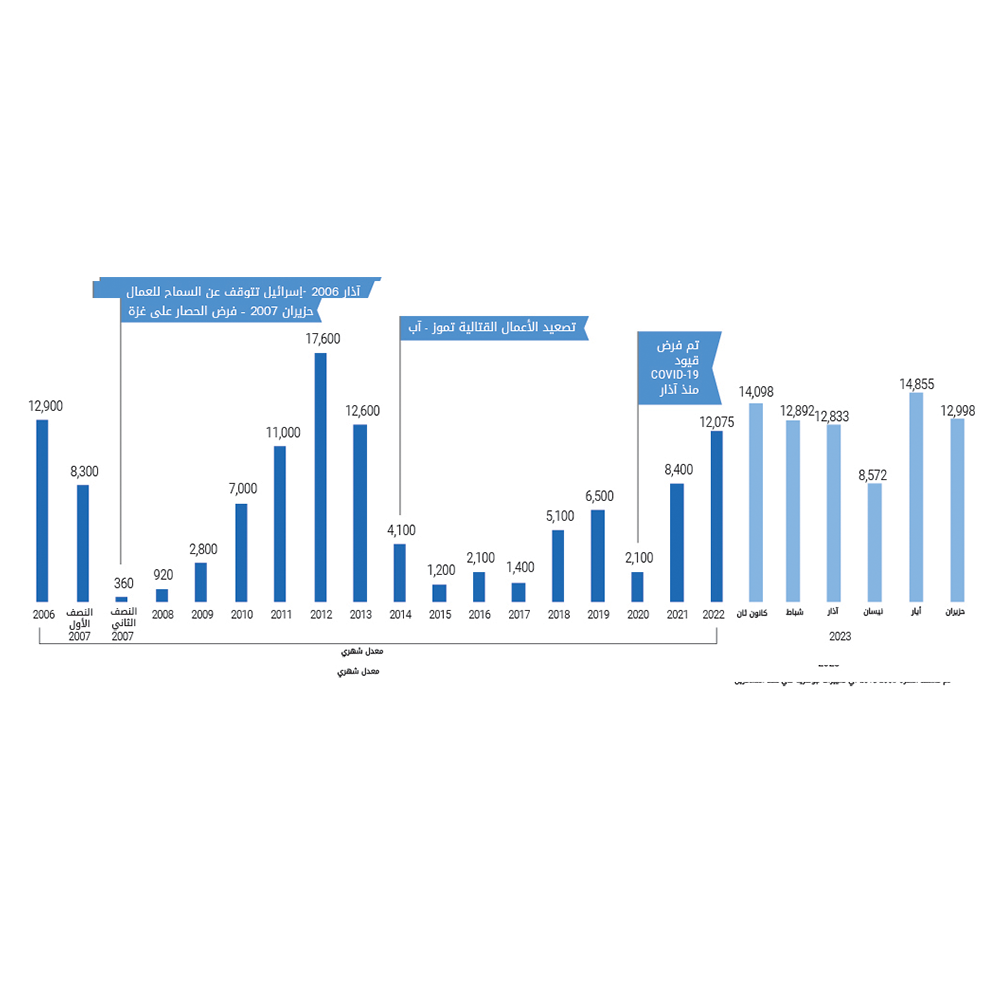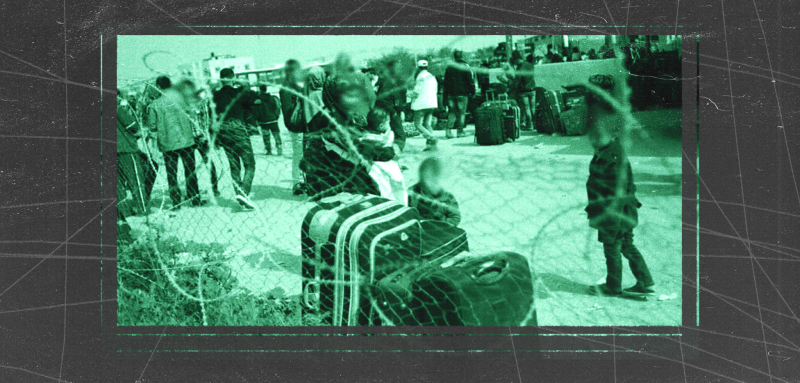"Do you have any romantic relationships outside of the Gaza Strip? Why haven't you gotten married yet?" These might seem like fitting questions asked during a date or romantic meeting, or perhaps within the context of family and friends. But in reality, these were the questions posed to Ihab, a 32-year-old Gazan, during a security interview while attempting to travel through the Rafah Crossing earlier this year. Sadly, his efforts ended in rejection, and he was compelled to return to the besieged territory, which has been his home since 2007.
The Rafah Crossing stands as Gaza's sole gateway to Egypt and the rest of the world. Palestinians seeking to travel through it must register their names with the Palestinian authorities two to four weeks prior to their planned departure. They can also submit travel requests directly to the Egyptian authorities through a specialized local company.
However, the travel procedures and decisions for the travel of Gazan citizens through the crossing, both by the Palestinian and Egyptian authorities, lack "transparency", according to the United Nations Office for the Coordination of Humanitarian Affairs (OCHA). OCHA states that only individuals with approved requests are permitted to pass during the crossing's official working days (Sunday to Thursday). Moreover, the journey to Cairo "is often long, involving multiple stops for inspection by the Egyptian security forces."
A report by the Israeli rights organization Gisha highlights that an average of 23,060 Palestinians crossed the Rafah Crossing in both directions on a monthly basis during the first 11 months of 2022. Unfortunately, this figure is lower than the monthly average of over 40,000 before 2013. Increasing reports indicate that the travel process through the Rafah Crossing has become more challenging and costly since the current president, Abdel Fattah el-Sisi, assumed power, with his administration introducing the "security coordination system".

The travel time from the Rafah Crossing to Cairo varies between 20 and 40 hours, while the return trip may extend to three days. This is in stark contrast to the previous travel time of just six to ten hours round trip before 2013. The delay is attributed to heightened security restrictions, repeated inspections, and changes in the travel route in Sinai.
A recent report by Human Rights Watch accuses Egypt of "restricting the movement of people and goods through the Rafah Crossing with Gaza, and sometimes even closing the crossing entirely."
"Do you have any romantic relationships outside of the Gaza Strip? Why haven't you gotten married yet?!".. Why would such questions be asked in a "security interview" for a travel request through the Rafah Crossing?
"One of the worst days of my life"
Since graduating from the field of civil engineering in 2013, Ihab has struggled to find work due to the high number of graduates in the same field, leaving most of them unemployed since construction projects in the sector are scarce. He contemplated traveling to Turkey as a tourist, hoping to discover job opportunities and settle there.
In 2005, Ihab Ghazzo ventured outside Gaza for the first time through the Rafah Crossing to Egypt, to visit his maternal grandfather's house in the Sharqia Governorate. It was a somewhat positive experience. However, he later had two "costly" travel experiences through the same crossing. The first occurred in 2018 when he accompanied his mother for medical treatment in Cairo, having to pay $800 to a travel agency to facilitate their entry. The second happened in 2019 when he went to the UAE in search of work, and he had to shell out $700 under the guise of "travel coordination" to expedite the process.
This year, Ihab decided to try his luck and apply for travel, wait for his "turn" and undergo routine procedures hoping to avoid paying the current exorbitant "coordination fees", which ranges between $200 and $500, according to testimonials from five other Gazan citizens who recently made the trip. It's important to note that the amount of coordination fees varies depending on the "broker" or the tourism and travel company.
Ihab tells Raseef22 revealed that the day he traveled turned out to be "one of the worst days of his life" as he endured two grueling security interviews. One was conducted by an officer from Gaza's internal security apparatus, affiliated with the Ministry of Interior, and the other took place on the Egyptian side of the crossing.
In the beginning, the Gaza officer inquired if Ihab had any intentions of returning to Gaza again, to which he responded, "I'm uncertain. I cannot foresee where life might lead me." Subsequently, the questions intensified and became more difficult, creating an overwhelming sense of pressure and tension for Ihab. He had to navigate his way through these inquiries with utmost care and answer the questions in the best way he could, knowing that he would inevitably return to the strip to reunite with his family and didn't want any enmity with the security apparatus responsible for the crossing.
Among the questions directed at Ihab during the security interview were: "Have you ever received funds from outside Gaza through bank transfers or exchange offices? What were your activities during your previous travel to the UAE? Have you met any representatives of security agencies there? Whom did you meet among your Gazan Palestinian friends in the UAE? Whom do you plan to meet in Turkey?"
He adds that he was subjected to a similar interrogation by an Egyptian officer, which culminated in the rejection of his travel request, leading him to pay "coordination fees" to process his application. Ihab strongly believes that there was no justifiable reason for his travel denial, and the only reasonable explanation he could think of was that he hadn't paid the "coordination fees".
The Egyptian authorities, responsible for managing the other side of the Rafah Crossing, do not disclose reasons for rejecting the travel applications of Palestinian citizens, some of whom may be perceived as having "security suspicions" from the Egyptian standpoint. Conversely, the Ministry of Interior in Gaza merely publishes the coordination lists on its website daily, featuring the names of individuals who have received approval to travel (ranging between 80 and 200 people), in addition to including the numbers of those banned from travel, which can reach dozens every week.
"Traveling anywhere outside Gaza is very easy. It isn't emotionally draining or as demeaning as my experience at the Rafah Crossing".. When will the people of Gaza be able to enjoy freedom of movement or at least have access to non-humiliating travel through?
Those surrounded by these "security suspicions" are compelled to undergo a process known as "entry without security clearance", which comes at a steep cost, ranging from five to eight thousand US dollars. If granted permission, the individual proceeds from the Rafah Crossing to a "deportation bus", and from there, to an Egyptian airport to directly travel outside the country. This was the case for Ihab's friend, who had planned to travel to Turkey and then onward to Europe by land.
A journey filled with "fear"
Even after paying the coordination fees, Ihab found himself destined to endure the same hardships faced by the majority of Palestinians using the Rafah Crossing – enduring long and grueling waits under conditions that are sometimes described as inhumane. "Inside the Egyptian hall," he recounts, "there are Gazans, burdened by the agony of waiting, who try to suppress their emotions, speaking in hushed tones, because the fear of humiliation is ever-present. We simply do not dare to criticize; we give in to the waiting until our names are finally called for travel."
Ihab, along with many other male Gazans, complain of being subjected to what they describe as "humiliating inspections" on the Egyptian side. On top of that, they are compelled to pay $150 for transportation to Cairo, in addition to a $35 entry visa fee. Ihab notes that the actual visa cost is $25 but he dares not inquire about the reason behind the additional charges.
He explains, "I am aware that 'coordination' is an illegal process, and that the travel fees imposed on us, as Gazans, are unlawful as well. However, we yearn to break free from this 'prison', yet none of us can object out of fear, for this crossing remains our sole gateway to the outside world."
"I am aware that the 'coordination' and travel fees imposed on us as Gazans are unlawful and an illegal process. We yearn to break free from this 'prison', yet none of us can object out of fear, for this crossing remains our sole gateway to the outside world"
Once the entry stamp phase is completed and they reach the transportation vehicles, the arduous journey begins, traversing desert roads and numerous checkpoints. Ihab emphasizes that those transported via the "deportation bus" are not allowed to stop or wait at any station except at the deportation room at Cairo Airport.
Ihab pauses as he recalls his last trip from Gaza to Egypt via the Rafah crossing, and compares it to his tourist trip between the coastal cities of Antalya and Alanya in Turkey, during a domestic flight. He realizes that he probably traversed an area possibly larger than Palestine itself. Contemplating the situation, he wonders, "The airport, the harbor, and the crossing... None of them possess Palestinian independence."
"I do not conceal my current ambition to reach one of the European countries and seek asylum there, simply to obtain any basic human rights that I, as a citizen of Gaza, lack. It has become abundantly clear to me that traveling anywhere else outside Gaza is very easy. It is not stressful or emotionally draining, and is not as humiliating or degrading as the indignity I was subjected to at the Rafah Crossing," concludes Ihab.
Raseef22 is a not for profit entity. Our focus is on quality journalism. Every contribution to the NasRaseef membership goes directly towards journalism production. We stand independent, not accepting corporate sponsorships, sponsored content or political funding.
Support our mission to keep Raseef22 available to all readers by clicking here!
Interested in writing with us? Check our pitch process here!



